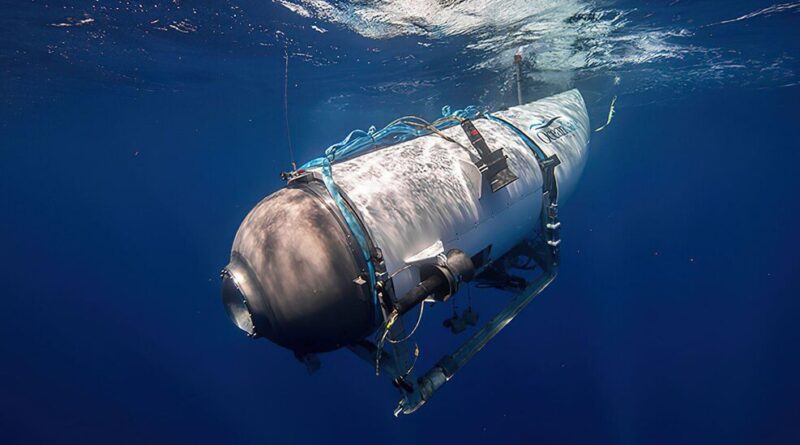What to Know About the Missing Titan Submersible and the Race to Find It
[ad_1]
A submersible watercraft with five people on board has been missing since shortly after it set out early Sunday to explore the site of the Titanic shipwreck in the North Atlantic.
Early Wednesday, the U.S. Coast Guard said on Twitter that a Canadian P-3 aircraft had detected “underwater noises” in the search area. Remotely operated vehicles were relocated “to explore the origin of the noises,” it said, but yielded “negative” results.
On Tuesday, Capt. Jamie Frederick of the U.S. Coast Guard said during a news conference that the vessel had about 40 hours of breathable air left.
Here’s what else to know.
When and where did the submersible disappear?
The 22-foot carbon-fiber and titanium craft, called the Titan, was deployed by a Canadian expedition ship, the M.V. Polar Prince, to travel nearly 13,000 feet down to the shipwreck site, on the ocean floor off Newfoundland.
The Titan lost contact with the surface ship an hour and 45 minutes after it started to dive on Sunday, the U.S. Coast Guard said.
Who is on board?
Five people are in the submersible: Stockton Rush, the founder and chief executive of OceanGate Expeditions, which operates the vessel; Hamish Harding, a British businessman and explorer; another British businessman, Shahzada Dawood and his son, Suleman, from one of Pakistan’s wealthiest families; and Paul-Henri Nargeolet, a French maritime expert who has been on more than 35 dives to the Titanic wreck.
Who owns the vessel, and why was it diving?
OceanGate, a private company based in Everett, Wash., operates the submersible.
OceanGate organizes expeditions that can last up to nine days to travel to shipwrecks and underwater canyons. According to the company’s website, OceanGate also provides crewed submersibles for commercial projects and scientific research.
Mr. Rush, an aerospace engineer and pilot, founded the company in 2009.
OceanGate calls the Titan the only crewed submersible in the world that can take five people as deep as 4,000 meters — more than 13,100 feet — below the surface of the ocean. Images of the vessel’s interior show that those onboard would have limited space to stand or sit.
The company has taken people on tours of the Titanic site since 2021, and guests have paid $250,000 to travel to the wreckage.
In 2018, leaders in the submersible craft industry were so worried about what they called the “experimental” approach of OceanGate that more than three dozen of them signed a letter to the company, obtained by The New York Times. In it, they warned of possible “catastrophic” problems with the submersible’s development and the planned voyage to the Titanic wreckage.
Where is the Titanic wreck, exactly?
The R.M.S. Titanic, the biggest steamship in the world at the time, hit an iceberg four days into its first trans-Atlantic voyage in April 1912, and sank to the bottom of the ocean. More than 1,500 people died.
The wreck was discovered in pieces in 1985, about 400 miles off Newfoundland.
Searchers are scouring the sea.
The U.S. Coast Guard was coordinating with the Canadian authorities and commercial vessels to help search for the Titan. Sonar buoys were deployed in the water, and the expedition ship was using sonar to try to locate the submersible underwater.
Aircraft from the United States and Canada, along with surface vessels, were searching the ocean surface in the area, in case the submersible had surfaced but had lost communications, according to a Coast Guard spokesman.
At the news conference on Tuesday, Captain Frederick said more aircraft were scheduled to join the search. The Navy was working to send more diving assets to the area. The French and British authorities also announced that they were aiding in the search.
It’s a very difficult search.
A submersible vessel diving down to the Titanic wreck encounters crushing pressure during the long descent. At the ship’s resting place, the weight of the icy ocean pressing down from above would be equal to that of a tower of solid lead as tall as the Empire State Building.
For search-and-rescue operations at sea, weather conditions, the lack of light at night, the state of the sea and water temperature all play a role.
Rescuing people underwater is even more difficult than on the surface. Many underwater vehicles are fitted with an acoustic homing beacon that emits sounds that can be detected underwater by rescuers. It’s unclear if the Titan has one.
An additional hazard is posed by the wreckage: The Titan or a rescue vessel could become hung up on a piece of wreckage that prevents it from returning to the surface.
If the submersible is found at the bottom of the sea, the extreme depths would limit the possible means for a rescue.
Reporting was contributed by Nicholas Bogel-Burroughs, William J. Broad, Emma Bubola, Amanda Holpuch, John Ismay, Jesus Jiménez, Victoria Kim, Salman Masood and Alan Yuhas.
[ad_2]
Source link


